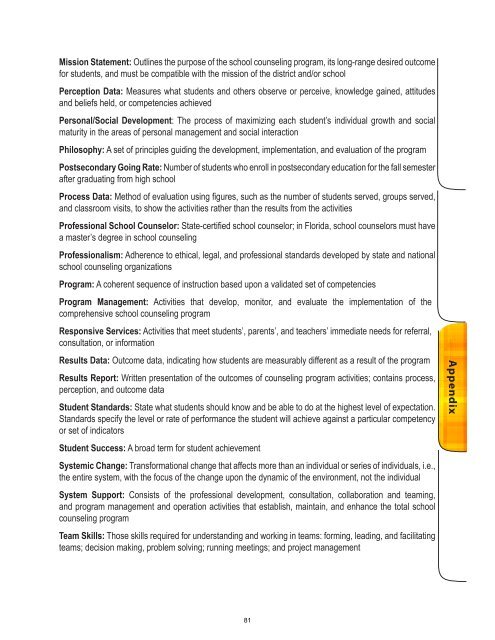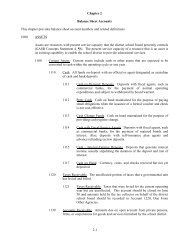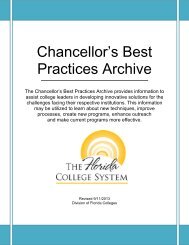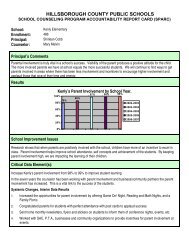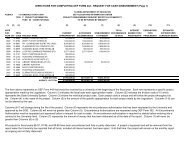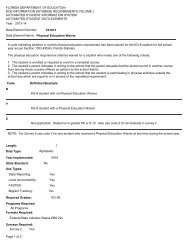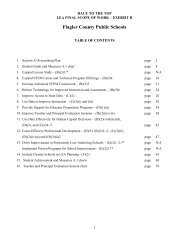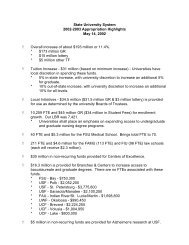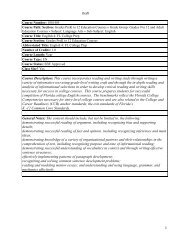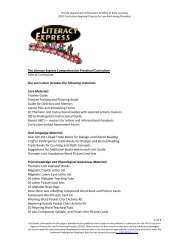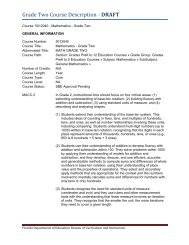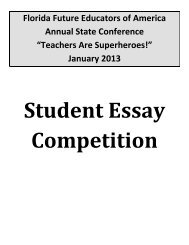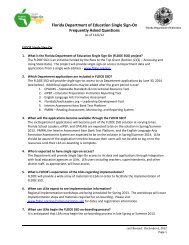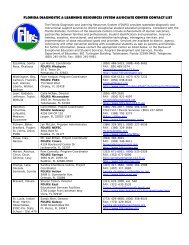Florida's School Counseling Framework - Florida Department of ...
Florida's School Counseling Framework - Florida Department of ...
Florida's School Counseling Framework - Florida Department of ...
Create successful ePaper yourself
Turn your PDF publications into a flip-book with our unique Google optimized e-Paper software.
Mission Statement: Outlines the purpose <strong>of</strong> the school counseling program, its long-range desired outcome<br />
for students, and must be compatible with the mission <strong>of</strong> the district and/or school<br />
Perception Data: Measures what students and others observe or perceive, knowledge gained, attitudes<br />
and beliefs held, or competencies achieved<br />
Personal/Social Development: The process <strong>of</strong> maximizing each student’s individual growth and social<br />
maturity in the areas <strong>of</strong> personal management and social interaction<br />
Philosophy: A set <strong>of</strong> principles guiding the development, implementation, and evaluation <strong>of</strong> the program<br />
Postsecondary Going Rate: Number <strong>of</strong> students who enroll in postsecondary education for the fall semester<br />
after graduating from high school<br />
Process Data: Method <strong>of</strong> evaluation using figures, such as the number <strong>of</strong> students served, groups served,<br />
and classroom visits, to show the activities rather than the results from the activities<br />
Pr<strong>of</strong>essional <strong>School</strong> Counselor: State-certified school counselor; in <strong>Florida</strong>, school counselors must have<br />
a master’s degree in school counseling<br />
Pr<strong>of</strong>essionalism: Adherence to ethical, legal, and pr<strong>of</strong>essional standards developed by state and national<br />
school counseling organizations<br />
Program: A coherent sequence <strong>of</strong> instruction based upon a validated set <strong>of</strong> competencies<br />
Program Management: Activities that develop, monitor, and evaluate the implementation <strong>of</strong> the<br />
comprehensive school counseling program<br />
Responsive Services: Activities that meet students’, parents’, and teachers’ immediate needs for referral,<br />
consultation, or information<br />
Results Data: Outcome data, indicating how students are measurably different as a result <strong>of</strong> the program<br />
Results Report: Written presentation <strong>of</strong> the outcomes <strong>of</strong> counseling program activities; contains process,<br />
perception, and outcome data<br />
Student Standards: State what students should know and be able to do at the highest level <strong>of</strong> expectation.<br />
Standards specify the level or rate <strong>of</strong> performance the student will achieve against a particular competency<br />
or set <strong>of</strong> indicators<br />
Student Success: A broad term for student achievement<br />
Systemic Change: Transformational change that affects more than an individual or series <strong>of</strong> individuals, i.e.,<br />
the entire system, with the focus <strong>of</strong> the change upon the dynamic <strong>of</strong> the environment, not the individual<br />
System Support: Consists <strong>of</strong> the pr<strong>of</strong>essional development, consultation, collaboration and teaming,<br />
and program management and operation activities that establish, maintain, and enhance the total school<br />
counseling program<br />
Team Skills: Those skills required for understanding and working in teams: forming, leading, and facilitating<br />
teams; decision making, problem solving; running meetings; and project management<br />
81<br />
Appendix


